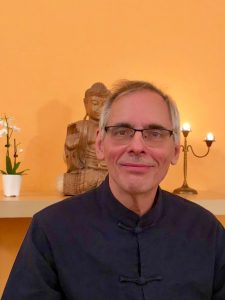
About Clifford Stevens:
I was born in the United States. My career included stints as a teacher, journalist, PR manager and translator. I have studied Qi Gong, Zen and meditation under Genro Xuan Lou, Laoshi for many years. Genro says that my meditation-imparted experiences and the Dharma transmission from him qualified me to be named a teacher of Zen in 2016.
My eldest son died tragically in 2008. I replayed the last days and hours as well as his whole life over and over in my mind. After a long period of sick leave, weekly visits to a therapist and intense soul searching, I encountered Zen Master Genro Laoshi. He was the first to show me how to deal with such a tragedy without ruining myself.
Genro self-published a book in German many years ago, and wanted to share his “insights” with a larger audience. He asked me to collaborate with him to do a revised, expanded and updated edition for the English-speaking world. The result was the new spiritual self-help book "Find the Seeker!"
What inspires you to write?
So many wise teachers, masters and prophets have walked on the face of the Earth, serving as signposts and facilitators. They inspire us because they have shown that we can in fact make our way down the path, embody the Oneness and realize our true nature. They have attained non-dual consciousness and manifested goodness, love and compassion. I am grateful to have personally met and be taught by several of them. Genro Laoshi can also tell stories about the teachers he encountered. However, it would be misleading to pick out just a few people because our message is a “universal” one. Absolute Being goes beyond all conditions, conventions and confessions. The book "Find the Seeker!" is not really about any of the people we mention (including ourselves). Their importance pales when being compared to the significance of what these people have to teach us.
Tell us about your writing process.
This book was a little different because I started with a basic text and had to expand upon it, update it and make the changes I thought were necessary. Genro and I went over each page and each paragraph to make sure that the text was in line with what we both had "realized".
At the very beginning of his famous classic Tao Te Ching, Lao Tzu stated that the Tao that can be expressed in words is not the eternally unchanging Tao. The challenge for me was to attempt to put in words that which is nameless and cannot be described.
My objective was to humbly attempt to express what cannot be expressed in words, to tell things straight but to make it all understandable and compassionately pick people up where they are. I hope the book will serve as an inspiration to help readers reboot their spiritual search and renew their lives.
This book (and any other) is only capable of giving readers a hint of what awaits them. We tell readers not to simply take our word for it. The work of finding the truth will have to be “done” by them. And this work won’t be “intellectual” in nature, but can only be directly experienced – by turning within.
What advice would you give other writers?
First, it is crucial to remain faithful to what one is and not adapt the book too much to please the audience. Second, give the book to a small selected group of people you can trust to look over. If you are involved in a book too long, you don't see things that need to be changed or corrected any more.
How did you decide how to publish your books?
We sent out the manuscript to a small number of publishers. We did get positive responses but the terms and conditions were not what we wanted. Eventually we decided to self-publish the book. I spent a lot of time learning about the business, getting offers and speaking to different people. Luckily we found a publishing house which is reasonably priced and very professional, and we retain all the rights to the book and all the net profits. People looking to self publish have to be very careful. The offering and the price spectrum are huge, it is hard to know in the very beginning what is necessary and what is not, and there are some people out there who want to exploit the ignorance of a writer to make money.
What do you think about the future of book publishing?
It is hard to predict the future. First of all, self publishing and print on demand has opened up new opportunities for authors. I think people who want to write are going to continue to make use of this option. Second, I do not know if everybody is going to want an e-book in the future or not. I personally have a Kindle and enjoy it, but I often like having a real book in my hand. Finally, the Internet is definitely opening up new opportunities for publishing and marketing, but I would be arrogant to claim I know how things are going to develop.
What do you use?: Professional Editor, Professional Cover Designer
What genres do you write?: Spiritual, self-help, Zen, happiness, body mind and spirit
What formats are your books in?: Both eBook and Print
Website(s)
Clifford Stevens Home Page Link
Your Social Media Links
Facebook
Twitter
Pinterest
All information in this post is presented “as is” supplied by the author. We don’t edit to allow you the reader to hear the author in their own voice.
